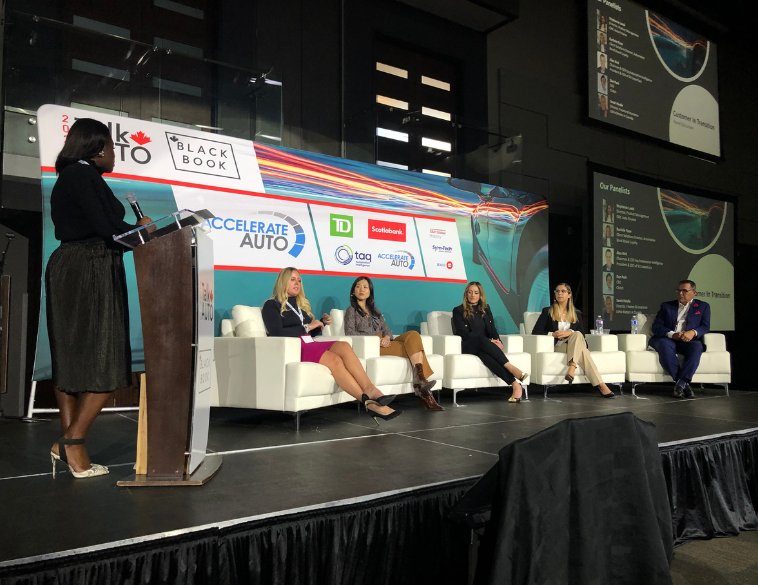In our first installment related to TalkAUTO 2022, we focused on current automotive trends, including projections for sales moving into 2023 as well as changes in specific vehicle segments, including projected increases in electric vehicle demand.
While advancing vehicle technology continues to be a key driver in the industry, consumer preferences, business structures, plus hiring and staffing trends are all changing the face of automotive retail.
As if to symbolize that, a panel discussion at TalkAUTO entited Customers in Transition, featured a host of professionals in the financing and automotive retail sector, who discussed some fascinating aspects related to the future of automotive retail.
Hosted by Stephanie Hendry, from Rogers Sports & Media, the panel featured Rachel Fiore, (Bond Brand Loyalty); Alan Bird (Taq Automotive Intelligence); Sarah Hindle (Lithia Motors); Stephanie Lamb (CIBC) and Maggie Ho, Clutch Canada.
Alan Bird, noted that when it comes to the customer experience, there was a notable distinction between the way traditional vehicles are marketed to customers and the approach many EV manufacturers are taking. While the former is largely still focused on the franchise retail model, and dominated by the legacy OEMs, the EV space—where a larger number of new manufacturers focusing their efforts—is emphasizing a more direct retail approach.
Visceral experience still counts
Bird explained that the proliferation of digital and virtual sales tools, has changed the retail experience from the traditional “visit the dealership” model. He said it was important to understand that while more and more aspects of the sales experience can now be conducted online, in many cases, customers still want to have that visceral experience of the vehicle before they actually buy, given it is such a big purchase for most.
That being said, we have seen an emergence of a truly digital purchase experience. Clutch Canada is a prime example. Maggie Ho said that, especially during the pandemic, the number of consumers that chose to purchase a used vehicle completely online increased significantly, driven by lockdown measures and other pandemic restrictions.
At Lithia Motors, Sarah Hindle, noted that the ability for consumers to make a choice when it comes to purchase, such as choosing to do it online, visiting the store, or generally a combination of both is key. She noted that Lithia’s Pfaff locations have gone to a single point of contact, with salespeople being the sole person interacting with the consumer through the entire purchase experience. The aim is to not only streamline the process, but provide customers with a smoother, more transparent and more consistent sales experience.
Wet signatures
On the lending side, Stephanie Lamb, discussed that while there have been significant developments when it comes to loan applications, wet signatures are still required in some jurisdictions (including Canada), meaning it currently isn’t possible to have a true, digital loan application experience. Lamb said that authentication of customers is of critical concern, but today, the technology does now exist to streamline the process, though in order to make it truly effective, lenders and dealers have a great opportunity to work together to not only improve security, but the overall customer experience for both qualifying for the loan and purchasing the vehicle. The topic of Open Banking was also discussed, and Lamb said that not only is it coming to Canada, it will impact the industry significantly, putting the power of ownership data back in the hands of consumers. Additionally, by providing a more transparent approach to lending and financing, it also has the potential to provide consumers with a more personalized experience; a more competitive marketplace, and a more trusted way to data sharing and retail transactions.
Rachel Fiore, noted that it was important for dealers to identify all consumer touch points, and that while technology can help deliver convenience, speed and satisfaction to the purchase experience, to really work effectively, it requires true human input and action.
The panel discussion also looked at the current situation regarding new vehicle inventory supply, and the importance for dealers to work with their customers to prevent any friction points and build long-term retention and trust. There was also a consensus that the concept of multiple, different approaches to automotive retail is here to stay, and how successful the transaction is will depend on dealers listening to the customer and understanding their individual needs and requirements.
Tighter lending, less spending
On the subject of consumer behaviour patterns, Mike Girard from Fitch Ratings, noted that although there has been an improvement in household finances since the onset of the pandemic, higher inflation and higher interest rates are likely to scale back purchases, particularly on big ticket items like houses and vehicles.
Anne Marie Desando and Rebekah Young from Scotiabank, delivered a fascinating session on An Industry in Transition from a banking perspective.
While short term economic indicators look less than rosy, with a small recession predicted during 2023, and stubborn inflation and higher interest rates continuing to bite, resiliency in the labour market and buffers in household balance sheets continue to drive the economy forward, which could lead to persistent higher inflation for the foreseeable future.
This kind of scenario; is likely to translate into fewer vehicle sales transactions as we head into 2023 and higher losses over the next 12 months, though the key to success going forward will be the ability to structure deals that make sense to customers, while at the same time, mitigating risk as much as possible.
Young said the psychological aspect of consumer spending needs to be considered too. At present, consumers are still spending, though rate hikes and looming uncertainty are likely to result in a pause as many households look to tighten their belts through at least the next two quarters.
For dealers, Desando, also noted that consolidation of retail locations is continuing, though tighter lending requirements could impact the pace of these consolidations going forward, at least in the near term. Additionally, the physical aspect of the dealership could change, given ongoing inventory supply issues, cost of construction and land for building new locations, leading to a smaller physical footprint and more of an emphasis on boutique type retail environments.
Keynote speaker Flavio Volpe, President of the Automotive Parts Manufacturers Association (APMA), stressed the need to take a realistic look at the hype regarding electric vehicles, and bold legislative claims made by governments at both the federal and provincial level. A big issue to achieving mass-market EV adoption continues to be charging infrastructure and the ability to adequately fund it.
And while there has been a big investment in battery manufacturing, there are still some big questions, such as finding the people to work in the sector, as well as access to natural resources to make it all work.
If an energy and EV transition is to succeed, it will require a collective effort between all sectors of the government and the economy, as well as including the huge automotive aftermarket industry which services and maintains the majority of vehicles on Canadian roads.
Volpe also stressed that from a Canadian perspective, it was also important to ensure harmonization with U.S. legislation, otherwise the economies of scale for making electrification a success in Canada simply aren’t feasible. “The industrial impact has to be in the U.S.,” said Volpe.
Other key highlights included the announcement of Canadian Black Book’s annual Residual Value Awards, as well as a special presentation from event key sponsor Accelerate Auto. A non-for-profit entity, Accelerate Auto is designed to promote diversity and inclusion in the automotive sector and ways in which to promote Black Talent to one of the country’s most important, dynamic and fast-paced industries.



